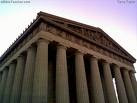 This is an older post, which I add to this blog due to the field-study emphasized here. I recently completed an MA on this topic and I am currently looking for the possibility to embark on a PhD for more indepth study in this area of research.
This is an older post, which I add to this blog due to the field-study emphasized here. I recently completed an MA on this topic and I am currently looking for the possibility to embark on a PhD for more indepth study in this area of research.I have spent almost two years emerging myself into source criticism, early Christian testimony to the Gospels and early oral transmission. The last three months I have occupied myself with early Christianity and oral tradition. It has been fascinating to study the works of authors, such as Sanders, Riesenfelt, Bultman, Kummel, Kloppenborg, Mack, Streeter, Bauckham and others. Yet I guess the most exciting part of my research has so far been probing into the text and world of the early church fathers.
I personally reject the methodology and approach of Sanders and most liberal critics here. Sanders proposes that the most realistic approach to the New Testament and the historical Jesus is to reject all historical fact and occupy oneself with modern theories. I find it funny that this approach is categorized as something that comes somehow near historical studies. This seems to confirm the words of Etta Linneman that modern Bible criticism is more of a philosophy than historical research. This aspect relates closely to the foundational presupposition of modern critical scholarship, namely the idea that the supernatural is absent from the natural world if it even exists.
I find it funny that intellegent atheists devout themselves to follow such approaches. I find it even more funny that adheres of the religion of Islam whose life and purpose is to undermine and wipe out the Christian, follow these secular theories.
So far I have opted for reading, comparing and devouting myself to the material and facts that are available rather than reading into these a range of modern conjecture created by individuals who were not even present in the first and second century, but seem to imply that they know more about the local details of the ancient world than Jesus, Paul, Justin Martyr and Irenaeus. Such an approach is extremely naive and virtually foolish, it reveals logical and academic integrity.
So where am I at with my insight into early oral tradition?
Early Christianity and oral tradition can be divided into three eras.
- The Oral Period
- The Transition Period
- The Post Transition period.
Each of these are again sub-divided:
The Oral Period is divided into, three eras:
- Jesus' transmission to his apostles and training of the apostles
- The Apostolic fixing of a oral body of information, including narrative and sayings
- The transmission of the Apostles to the apostolic disciples (successors)
The Transition period is divided into:
- Oral transmission still dominant but its text in existence (Papia-Polycarp)
- Text dominant but Oral transmission still in existence (particularly among the illiterate) (Justin Martyr-Irenaeus)
The Post Oral era relates mainly to one aspect, in which oral tradition is a matter of interest (Clement of Alexandria - Origin)
While the use of text is already referred to by Papias in 80-100 AD to Matthew and Mark, and later by Justin Martyr (150). It is interesting that the favour of the written word does not derive until the death of Polycarp, even though Christians read and used them (see Ignatius of Antioch).
The reason being, Christians applied the ancient rule of 'the living and the abiding word', that is history is effective history as long at the eyewitnesses are still alive and are able to transmitt the information and confirm it.
Polycarp was the last of the apostolic disciples and died approximately 140-50 as a martyr.
After Polycarp, the oral transmission is continuous, the Christians turn however to the transmission of the apostles in its written form, as the written form had been written under the guidance of the apostles and the successors (e.g. Luke).
In other words the Gospels are of the same nature as the 'living and the abiding word'.
The study is fascinating and it provides strong historical evidence that the Gospel information could not have been corrupted or fabricated within the first 200 years of Christianity.



First, thank you very much for blogging this...I'm enjoying browsing very much. Is it possible for you to edit and correct a couple of small things? Were you aiming for 'immersing' instead of 'emerging' (as immersion is diving in--vs coming out of) and shouldn't it be 'devoting' (and devote) rather than 'devouting' (lol and let us never forget 'a' before consonants, 'an' before vowels "The Apostolic fixing of a[n] oral body of information"
ReplyDeleteI know these are SUCH tiny little things...it's just that I hate the thought of naysayers feeling superior on a technicality.
Please feel more than free to delete this comment (Yours is actually the first blog I've commented upon I believe) Or if this is like facebook, and only the one who writes it can delete it--I'm more than glad to (if it's even possible) Again, thank you very much for gathering these resources and blogging! ♥